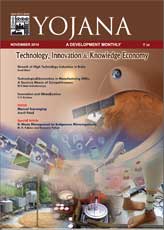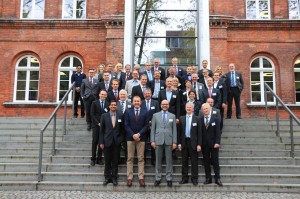On 15th April at the Hannover Messe the Federal State of Niedersachsen (Lower Saxony) is organizing a symposium on frugal innovations (language medium: German), with a subtitle which says “simple, simpler, the best”. The event which takes place at Nord/LB Forum between 14:00 and 18:00 hours would see several prominent speakers including Mr. Olaf Lies, Minister of Economy, Labour and Transport in Niedersachsen. Dr. Stephan Buse from CFI is also scheduled to deliver a talk with the title “Frugal Innovation – ein Konzept zur Erschließung kostensensitiver Märkte” (English: Frugal Innovation – A Concept to Capture Cost-sensitive Markets”.
Category Archives: English
Frugal Innovation in Healthcare: New book from Aditi Ramdorai and Cornelius Herstatt
 Aditi Ramdorai and Cornelius Herstatt have published a new book titled “Frugal Innovation in Healthcare: How Targeting Low-Income Markets Leads to Disruptive Innovation” (Springer Verlag, ISBN 978-3-319-16335-2). The book is scheduled to arrive in bookshops on May 14, 2015. It has been published in the “India Studies in Business and Economics” series of Springer and is already the second title by CFI team in this series. The first publication was “Aiming Big with Small Cars: Emergence of a Lead Market in India” by Rajnish Tiwari and Cornelius Herstatt, published in 2014.
Aditi Ramdorai and Cornelius Herstatt have published a new book titled “Frugal Innovation in Healthcare: How Targeting Low-Income Markets Leads to Disruptive Innovation” (Springer Verlag, ISBN 978-3-319-16335-2). The book is scheduled to arrive in bookshops on May 14, 2015. It has been published in the “India Studies in Business and Economics” series of Springer and is already the second title by CFI team in this series. The first publication was “Aiming Big with Small Cars: Emergence of a Lead Market in India” by Rajnish Tiwari and Cornelius Herstatt, published in 2014.
About “Frugal Innovation in Healthcare” (publisher’s description)
A case of frugal organizational innovation in governance!?
By: Rajnish Tiwari
Just noticed an interesting news item from India in The Economic Times of Oct. 22, 2014. The government has decided to put all replies to queries filed under the “Right to Information” (RTI) act online so that not only the person/organization having filed the query receives the information, but any interested person worldwide.
According to the report:
“Starting next month [i.e. Novemebr 2014], all replies given under RTI by ministries will be posted online, available for access to all and not just to persons seeking the information. This will mean unprecedented scale of disclosure and cheer transparency advocates […]. Until now, only the person filing the RTI application seeking replies from a ministry or a government department would get the reply and that too mostly via post.”
I imgaine that this move could be proably seen as a frugal innovation – an organizational innovation in the sense of the OECD/Eurostat definition of what an innovation is. By employing a high-tech/Internet-based solution the govt. can combat corruption while being able to dissemniate relevant information of public interest worldwide for almost no additional costs.
Read the complete news report: “Narendra Modi government takes RTI to another level: All replies to be put online” (Oct. 22, 2014), accessed: Nov. 2, 2014.
New article: “Positioning India as an Innovation-Driven Economy”
 A new magazine article by Rajnish Tiwari on India’s still-less-recognized foray into innovativeness and why global rankings can sometimes paint an erroneous picture of the true extent of this phenomenon. The article has been published in “Yojana“, a multi-lingual magazine published by the Ministry of Information and Broadcasting, Govt. of India (Vol. 58, Nov. 2014, pp. 45-48).
A new magazine article by Rajnish Tiwari on India’s still-less-recognized foray into innovativeness and why global rankings can sometimes paint an erroneous picture of the true extent of this phenomenon. The article has been published in “Yojana“, a multi-lingual magazine published by the Ministry of Information and Broadcasting, Govt. of India (Vol. 58, Nov. 2014, pp. 45-48).
Imperative of Frugal Innovations for Emerging Markets and Beyond
A Report on the Schmalenbach-TUHH Symposium
By: Dr. Rajnish Tiwari
On the 9th and 10th October 2014 a well-received symposium on the topic of frugal innovation was held at the premises of Hamburg University of Technology (TUHH). The symposium, carrying the title “Frugal Innovation” und die Internationalisierung der FuE: Hintergründe, Strategien, Fallstudien (English title: “Frugal Innovation and the Internationalization of R&D: Backgrounds, Strategies and Case Studies”) was organized by the Working Group on Innovation Management of the Schmalenbach-Gesellschaft für Betriebswirtschaft e.V. (hereafter SG) in collaboration with the Center for Frugal Innovation (hereafter CFI) of TUHH. The symposium with close to 45 participants from the industry and academia was well-attended and saw some very interesting contributions by invited speakers. The insights generated here through a unique setting of business/academia interaction can potentially push the envelope of research and help expand the currently limited understanding of frugal innovations.
(Note: For a PDF version of this article click here, otherwise you may continue reading in HTML format)

